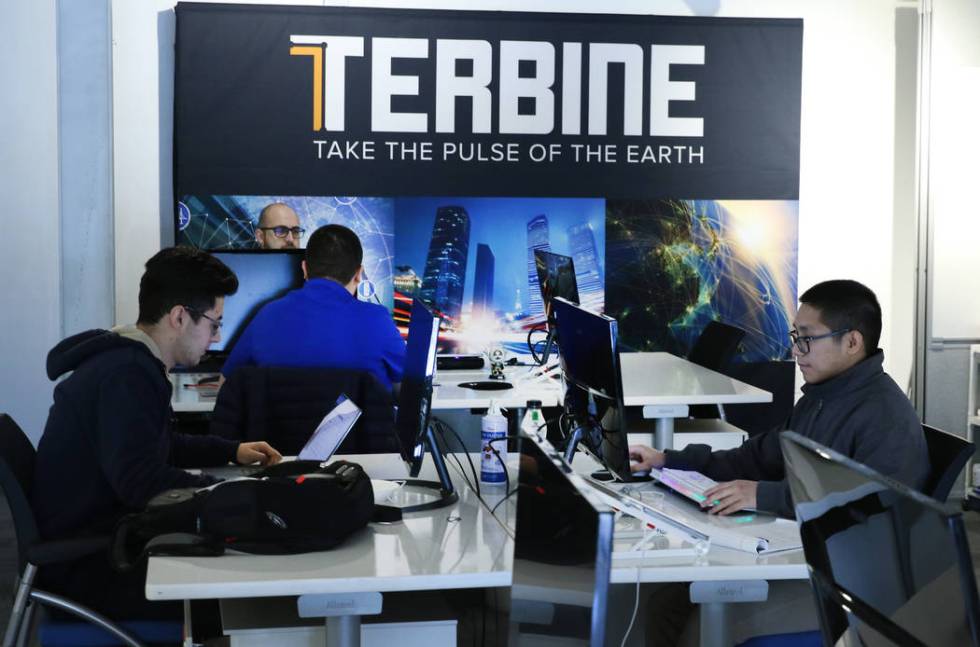Terbine CEO has big plans for his Las Vegas data firm

Terbine Chief Executive David Knight said he was glad to say goodbye to Silicon Valley six months ago and move his technology firm to downtown Las Vegas.
“It’s just gotten so costly,” he said. “The thing that put me over the top out of the Bay Area was that Google and Facebook got approval from their local county authorities to build dormitories on their campuses … because people can’t afford to live there, and I said, ‘Boy, this kind of reminds me of feudalism in the Middle Ages.’ ”
Since moving in May into the International Innovation Center, a coworking space created by the city of Las Vegas at the corner of Lewis Avenue and Fourth Street, the internet of things data firm has hired 20 UNLV graduates. Three weeks ago, it launched its Terbine Exchange IoT data marketplace.
The online portal allows organizations to access multiple types of sensor data such as vehicle counts, air quality, electricity and water usage from cities in more than 50 countries. Typically, organizations would have to create separate accounts with individual providers such as a city’s water department and transportation office in order to access their sensor data.
Terbine says offering the information in a single platform will let cities and government agencies compare notes and use the information to help create efficiencies around traffic management and monitoring air quality, among other things.
Terbine has plans to eventually monetize the platform into a subscription model, charging commercial entities. Academic and nonprofit institutions will have free access.
“We want to be the authoritative source for the physical world,” Knight said during an interview last month. “We think it will be really helpful for people thinking about how to make cities more efficient, but it’s been really hard to get here because nobody else has tried to bring all the physical world data into one system.”
Smarter cities
The Terbine Exchange website shows a list of recently added data, including vehicle counts collected by the Vermont Agency of Transportation and groundwater temperature recorded at wells throughout Texas by the Texas Water Development Board.
Only a small sample of the data — in strips of code — is shown. To access the free information, organizations must create a Terbine account. Knight said it prohibits individuals from accessing the site to keep the information offered secure and private — though much of data on the exchange is publicly available.
So far, Terbine has pulled together an estimated 24,000 data feeds from public agencies in 54 countries.
The focus now is to continue gathering and categorizing the information it collects from agencies, including the city of Las Vegas. For example, Knight said the city plans to install additional smart street lamps that can measure everything from sound levels to air quality, and the data will be fed into Terbine’s platform.
Eventually, the firm will create a marketplace where cities can sell the information to third-party firms for a fee.
“(Cities) can sell their data using the same precedent (to) charge you to park on a publicly tax-funded street,” Knight said.
Any practical uses have yet to happen, because the platform only launched in late October, but Knight said he has an idea of how the data can be used, citing this month’s launch of its Global IoT Datathon.
The competition tasked students to find innovative uses for IoT data from Terbine Exchange for a chance to win up to $6,000 in scholarship money and even an authentic NASA flight jacket signed by a NASA astronaut.
University of Malaya student Lim Wei Jie, who received the creativity award, analyzed carbon dioxide data from Paris to propose a system that would adjust toll charges in the city based on carbon dioxide levels in the city — the higher the levels, the higher the charge — which could encourage more people to use public transportation.
‘One-stop shop always wins’
Knight founded Terbine three years ago, netting seed investors such as Peter Knez, former co-chief investment officer of BlackRock Inc. and founder of Knez Ventures.
It’s not the first startup for the Santa Monica, California native, who co-founded the now-defunct tech firm Isocor, which sold email and directory software in the 1990s and was acquired by Critical Path. He also co-founded Click2send, an early file delivery service similar to WeTransfer.
Knight said he envisions Terbine Exchange becoming as ubiquitous to the IoT data world as the Bloomberg terminal — which offers investors and traders real-time financial data, news and a messaging function — has become for financial firms.
But unlike the roughly $20,000 annual subscription fee to use a Bloomberg terminal, Terbine Exchange is remaining free — for now.
“About two-thirds of what’s in Bloomberg is free public data, (and) having it all in one system makes Bloomberg valuable because they just provide a one-stop shop,” Knight said. “If you look historically, one-stop shop always wins.”
Contact Subrina Hudson at shudson@reviewjournal.com or 702-383-0340. Follow @SubrinaH on Twitter.